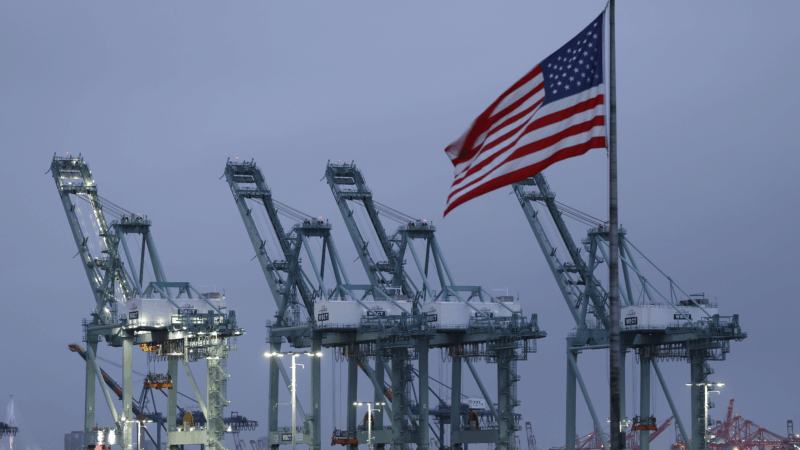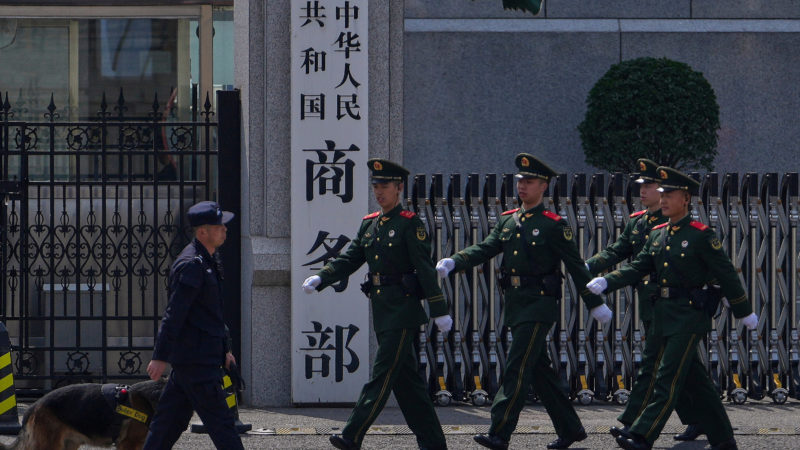In the wake of tariffs, cargo at the Port of LA is down 35%
Each weekday morning outside the Dispatch Office of the International Longshore and Warehouse Union (ILWU) Local 13, dozens of dock workers gather, hoping to get some work at the vast ports of Los Angeles and Long Beach. Usually it’s relatively easy to find – and workers are given a white slip of paper with details of where to go and when to show up.
But on Tuesday morning, many left empty-handed.
“Less volume of cargo containers means less work for us,” said longshore worker Charlie Camacho. His job typically consists of loading and unloading shipping containers. “So we feel it, we definitely feel it,” he said.
Together these two ports comprise an extremely busy port complex – the Port of Los Angeles alone is the busiest in the Western Hemisphere. But in the month or so since tariffs against Chinese goods ratcheted up – port officials here have been predicting a drop in cargo. This week, they announced it was down 35% compared to the same week last year.
The immediate impact of the cargo decline affects virtually every business around the ports: trucking, shipping, distribution centers, and others. But port officials say this downturn will soon be felt much more broadly – by manufacturers and retailers around the country, as well as consumers.
Volume down, local businesses suffering
In 2024, approximately 31% of everything that came into or out of the U.S. in shipping containers over water, came through this port complex. Last year, the ports handled 19.9 million of those containers – but it’s likely to be less in 2025.
Camacho, whose family has worked at the ports for three generations, spoke with pride about working as part of this system.
“My grandmother was one of the first women to work at the ports,” he said. “I sometimes think I am doing this for her.”
When asked about his chances of finding work on Tuesday, he was not optimistic – “Ah man, like 25 percent, maybe,” he responded.
He ultimately left the dispatch office with no gig.
It’s not just longshore workers who are being affected – a dip in cargo affects a huge ecosystem of businesses that are connected to the importing and exporting of goods in Southern California.
Frank Groves is an independent salesman who makes his money selling gloves and safety gear to port workers. He was also at the dispatch hall on Tuesday, trying to find customers – but he says business has dropped nearly 75 percent in recent weeks.
“No sales at all really. If they aren’t working I don’t make money,” he said.

(Steve Futterman)
Rob Walpole‘s business is also down. He’s the CEO of Customs Goods, which is based in nearby Carson, California and handles shipments of products once they arrive at the ports.
“We’ve seen significant reductions of import shipping volumes into this country,” he said. “That means significantly less volumes we will be handling on behalf of our customers.”
“You name it, they all come through our ports”
“The situation is not good,” said Gene Seroka, the executive director of the Port of Los Angeles. “People are quite concerned, absolutely.“
According to the Port’s website, 1 in 12 jobs in Los Angeles and Long Beach are supported by the ports. But their economic footprint goes well beyond Los Angeles and California.

“The impact the Port of Los Angeles has on the city, the region, and the country cannot be understated,” said Seroka. “The cargo that moves through this port reaches not only all 50 states, but each one of our 435 congressional districts.”
That could include food, medical supplies, manufacturing components, and finished products, according to Sal Di Constanzo, a labor Relations Representative for the ILWU Local 13.
The port lists furniture, auto parts, apparel and electronics among their top imports.
“You name it, they all come through our ports,” Di Constanzo said.
According to Seroka, big importers say shoppers could start to see shortages in four to six weeks, once inventory that was stockpiled ahead of the tariffs runs out. He says they also may start to see significant price hikes.
Long-term concerns
Even if the increased tariffs go away, some of these problems could persist for a while, said Diane Middleton. She’s a former Los Angeles City Harbor Commissioner who has been working with the ports for more than 50 years.
“You don’t just have ships lined up like taxi cabs,” she said. “You have to reserve vessels. You have to specify a time. Once you’ve cut all that off, you can’t bring it back in a minute.”
And in the long term, she added, decades-old trade patterns may be permanently changed. She thinks that while the U.S. will always be a desired customer, countries like China may seek out others with less political upheaval in the trade sector to do business with in the future.
Transcript:
A MARTÍNEZ, HOST:
Traffic at major trading hubs in Southern California is down a lot. The ports of Los Angeles and Long Beach are, together, the largest port complex in the U.S. And in the month or so since President Trump ratcheted up tariffs against Chinese goods, port officials had been predicting a drop in cargo. Now, this week, they said it fell by more than a third compared to the same week last year. Steve Futterman reports on how that’s affecting the people whose livelihoods are connected to the ports.
(SOUNDBITE OF PORT ACTIVITY)
STEVE FUTTERMAN, BYLINE: Yesterday, outside the Longshore Union’s dispatch hall, around 70 to 80 people who typically load and unload shipping containers were milling around. They were hoping for assignments. Thirty-nine-year-old Charlie Camacho is one of those who came looking for work. It’s becoming harder to find.
CHARLIE CAMACHO: Less volume of cargo containers means less work for us. So, yeah, we feel it. We definitely feel it.
FUTTERMAN: Usually, when Camacho shows up, he gets jobs. Not right now.
Give me the realistic odds of getting work today.
CAMACHO: Ah, man. It’s, like, 25%, maybe.
FUTTERMAN: When people like Camacho don’t work, it impacts others. Frank Groves sells gloves and safety gear to dock workers and says his business is down nearly 75%.
FRANK GROVES: You know, no sales at all, really. If they’re not working, I don’t make no money.
FUTTERMAN: The immediate impact of the cargo decline affects virtually every business around the ports – trucking, shipping companies, distribution centers and others. Rob Walpole is the CEO of Custom Goods. His company handles shipments of products once they arrive in the U.S.
ROB WALPOLE: We’ve seen significant reductions of import shipping volumes into this country. That means significant less volumes that we’ll be handling on behalf of our customers.
GENE SEROKA: The situation’s not good.
FUTTERMAN: That’s Gene Seroka, the executive director of the Port of L.A.
SEROKA: Cargo volume this week for imports is down 35% compared to last year. People are quite concerned, absolutely.
FUTTERMAN: He says this doesn’t just affect people who work directly with the port.
SEROKA: The impact the Port of Los Angeles has on the city, the region and the country cannot be understated. The cargo that moves through this port reaches not only all 50 states, but each one of our 435 congressional districts.
FUTTERMAN: According to Seroka, big importers say shoppers could start to see shortages in four to six weeks, once inventory that was stockpiled ahead of the tariffs runs out.
SAL DICOSTANZO: You name it. They all come through our ports.
FUTTERMAN: Sal DiCostanzo is with the major union here – the International Longshore and Warehouse Union, Local 13.
DICOSTANZO: Foods come and go, medical supplies, manufacturing components, finished products.
FUTTERMAN: Diane Middleton is a former member of the L.A. City Harbor Commission, which oversees the port. She says even if the tariffs were lifted today, it would take time for the supply chain to recover.
DIANE MIDDLETON: They don’t just have ships lined up like taxicabs. Once you’ve cut all that off, you can’t bring it back in a minute.
FUTTERMAN: She also worries that in the long term, trade could be forever changed. She says many countries, especially China, may be finding new and more dependable destinations for their goods, and they may choose to ship less to the U.S.
For NPR News, I’m Steve Futterman at the Port of Los Angeles.
Trump’s many tariff tools mean consumer prices won’t go down, analysts say
The Supreme Court struck down President Trump's signature tariffs. But the president has other tariff tools, and consumers shouldn't expect cheaper prices anytime soon, economists say.
Hundreds of American nurses choose Canada over the U.S. under Trump
More than 1,000 American nurses have successfully applied for licensure in British Columbia since April, a massive increase over prior years.
5 takeaways from Trump’s State of the Union address
President Trump hit familiar notes on immigration and culture in his speech Tuesday night, but he largely underplayed the economic problems that voters say they are most concerned about.
China restricts exports to 40 Japanese entities with ties to military
China on Tuesday restricted exports to 40 Japanese entities it says are contributing to Japan's "remilitarization," in the latest escalation of tensions with Tokyo.
Signs, silence, and skipping: How Democrats protested Trump’s State of the Union
The pushback comes as Democrats enter a midterm year where they hope to make gains in the House and Senate.
Trump honors gold medal-winning men’s hockey team at State of the Union amid controversy
The celebration of the men's team comes after FBI Director Kash Patel's trip to the Games in Milan, and the president's comments about the U.S. women's team, have drawn scrutiny.







